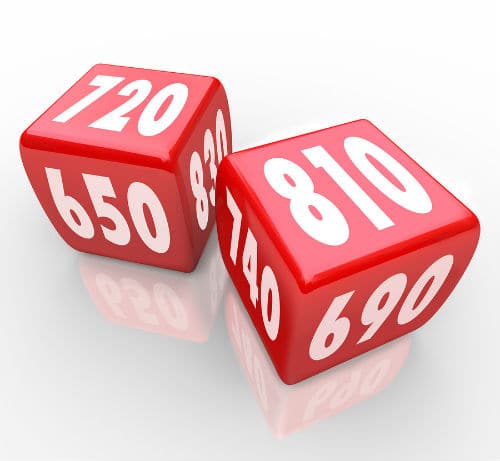If you want a home loan, you may be wondering how high your credit score needs to be in order to qualify for a home mortgage.
Well, there’s good news and bad news regarding your credit and how it relates to your chances getting a “yes” from a home lender.
First, the bad news: if you have extremely poor credit, it’s possible that your credit standing could prevent you from securing a mortgage. At the very least, with bad credit, you’ll definitely pay well above the going rate for a home loan. With fixed-rate, 30-year mortgages currently hovering well below 4%, a much-higher interest rate could translate into a house note that’s hundreds of dollars extra each month.
But the good news is that even if you have credit blemishes, or less than perfect credit, that won’t stop you from qualifying a mortgage – as long as you have other positive factors going for you that would give a lender confidence in your ability to repay a home loan.
Read on for more details about your how credit impacts your home lending prospects and what minimum score you need to qualify for a home loan.
For starters, it’s important to realize that many lenders have underwriting guidelines that dictate mortgage interest rates – and even whether you’ll get approved at all for a mortgage.
Part of their guidelines pertain to your credit score.
For example, using credit scores alone, someone with “perfect” credit – i.e., an individual with a FICO score between 760 points and 850 points – would qualify for almost any lender’s lowest interest rates. People with excellent credit have proven to be a great credit risk and that’s the reason that mortgage lenders would be willing to extend them home loans at the most attractive rates available in the marketplace.
But what if you don’t fit into the perfect credit category? Not to worry. You can still get a loan. You just may have to accept an interest rate that’s 1/8th or maybe 1/4th of a point higher than the person with perfect credit.
For instance, if your credit score is 720 or maybe even 740, you may qualify for the second-best loan rates offered. So if a person with a pristine 800 FICO score can currently nab a 3.75% interest rate, you’d likely get a rate of 3.825% or maybe 4.0%.
Tip: every lender has a minimum high credit score to get their best rate. Ask what it is. It could be 760, 740 or in some cases, even 720.
What’s important to realize is that you are considered to have good to very good credit if your credit score is between 700 and 760 points. Within this credit range, you should have no trouble at all landing a mortgage.
Credit Scores in the 600 range
Things get dicey, however, when your credit score is in the 600 range or lower. Many banks will still give a mortgage with a 640 or a 680 FICO score, but you’ll definitely be paying a higher rate – typically, at least half a percentage point more. So in today’s environment, your interest rate might be roughly 4.25%.
So what’s the lowest credit score you can have and still get a mortgage? For any FHA-backed mortgage, you must have at least a 620 FICO score. This score requirement began in 2014.
Fannie Mae guidelines do allow for some exceptions to that 620 score, but for the most part a 620 is mandatory for the average home buyer. You can even have a 620 score and put as little as 3% down on a home with an FHA loan.
Lenders want to be able to sell home loans they make to Fannie Mae (and Freddie Mac as well), so they typically will require you to abide by Fannie’s credit guidelines.
But if a lender plans to keep your home loan, and not sell it to Fannie or Freddie, it’s really up to the lender’s own underwriting criteria to determine minimum credit score requirements.
Most lenders who keep their loans (i.e. “portfolio” their loans, in industry lingo) will go after the higher end of the market: wealthier borrowers with good to excellent credit who want bigger mortgages. But some aggressive lenders may court homebuyers at the other end of the spectrum: borrowers with higher debt levels and tarnished credit.
The tradeoff for the latter borrowers is that they’ll get mortgages, but they’ll pay a premium for those home loans to offset a lenders’ risk in loaning to someone with so-so or even poor credit.
Beyond Your Credit Score
Fortunately, in getting a home loan, your credit score is just one criteria. Some mortgage services and companies will also look at your debt-to-income ratio, how much cash savings you have on hand, your job stability, as well as the size of your home down-payment, and the loan-to-value ratio of the mortgage in question.
Even if you don’t have exceptional credit, if you look good on paper to a lender as it pertains to these other criteria, then those are considered “compensating factors” that boost your chances of getting a mortgage.
Also, it’s one thing for a bank officer to make a determination that you can swing, say, an $1,800 a month mortgage, based on your current obligations. But whether you can truly afford the home is question is often a different story – and it’s really a determination that you alone can best make when you take into account your complete financial picture and your personal plans.
For instance, a mortgage banker doesn’t know if you plan to have a baby a year from now. Nor does a loan officer know if you intend to start a business or go back to school in the not-too-distant future. All of these things require money.
So if you ever apply a mortgage, don’t just take into consideration your credit score. Be sure to take a good, hard look at your overall finances – now and into the future too.








